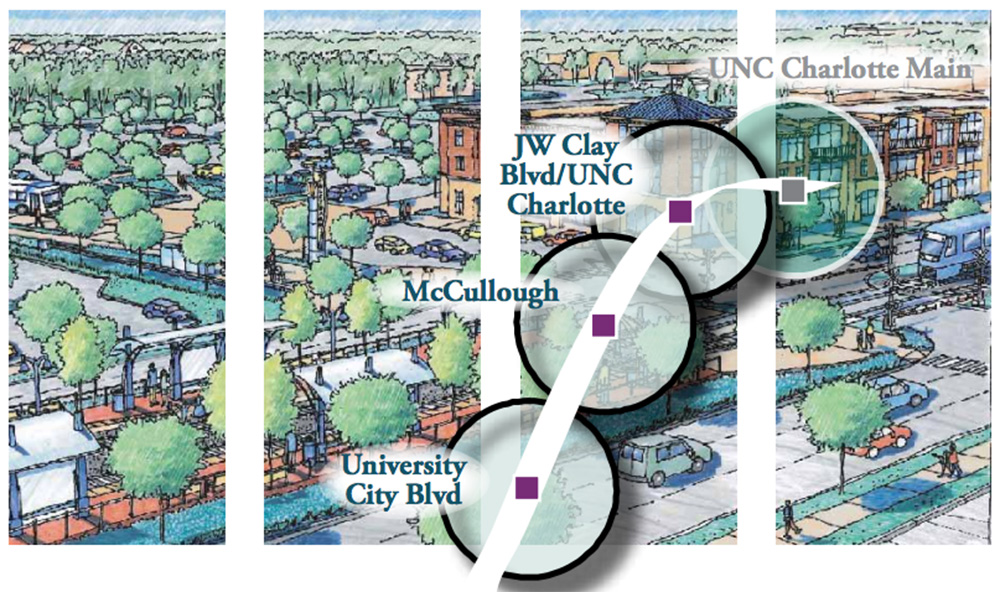Support the University City Area Plan!

A rendering of the University City transit station areas.
Do you want walkable, transit-oriented development in University City?
Transit-oriented development (TOD) creates vibrant, people-oriented places that are safe and convenient to bike, walk and ride transit.
A key opportunity to ensure we fully leverage our $1.1 billion light-rail investment to extend the Blue Line from uptown to University City exists next Monday evening, April 13, at the Charlotte City Council meeting – and you can have a part. We encourage you to show your support by attending the City Council meeting on April 13th, and by signing our petition! Click here to read more about our petition and to sign online.
“This is everyone’s chance to have real input on the plan as we move toward finalization and approval,” said District 4 Councilman Greg Phipps, who represents University City.
Petition signatures, as well as comments offered next Monday or submitted via email and letters will help City Council decide whether to approve the revised plan. The council will likely vote on adoption by June.
What is the plan?
The University City Area Plan is the city’s main guide for shaping how the coming LYNX Blue Line (light-rail) can transform the North Tryon Street corridor around University City’s three future transit stops – much the way that the original LYNX Blue Line from uptown to Pineville has attracted walkable urban development near stations in South End and beyond.
Why do you need my support?
The proposed plan envisions the creation of vibrant, pedestrian-oriented transit stations at the three stops within University City (and a fourth on UNC Charlotte campus). It is important that the city creates and executes strategies that will allow the University City transit corridor/N. Tryon to develop as the urban center for this area, and realize this vision.
Currently, the UCAP identifies the properties surrounding the transit stations as “core areas”, however, these are only recommended for transit-oriented development (TOD); they are not currently zoned for TOD. [A transit-oriented development (TOD) is a mixed-use residential and commercial area designed to maximize access to public transport, and often incorporates features to encourage transit ridership.]
Therefore, we are asking City Council to not only adopt the UCAP but also to rezone all of the properties within 1/4 mile of the transit stations to TOD using a tool called “corrected rezoning”. Doing so will ensure that the future development that takes place in the areas nearest the transit stations will be compatible with the Blue Line Extension (light rail) and fulfill the UCAP’s vision for this part of University City.
How can I show my support?
1) Sign our petition! Click here to read and sign online our petition online.
2) Sign up now to speak on Monday: Registered speakers can talk for up to three minutes each. Register to speak online or call 704-336-2248.
**We encourage you to take part in requesting that the plan is approved, and that following adoption of the plan, City Council takes the actions that are necessary to make this plan a reality — as outlined in our petition. We would be happy to provide you with key talking points! Please let us know if you are able to speak at the meeting by replying to this email!
3) Come to the Council meeting: The Council meeting will begin at 7 pm in the main meeting hall of the Charlotte-Mecklenburg Government Center, 600 E. 4th Street. Parking is available in the deck directly across Davidson Street from the building, though we encourage transit, biking, or walking. Even if you do not speak, you can show the council your support by being present.
4) Learn more about the plan: Download the full document and much more at the Plan website.
5) Email City Council: Click here to e-mail our Council members.
We hope you will show your support!
Thanks for reading!
As a nonprofit, community support is essential for us to keep doing what we do — including providing free articles like this. If you found this article helpful, please consider supporting Sustain Charlotte.
Want to stay in the loop? Subscribe to our weekly newsletter and follow us on Instagram, Facebook, and Twitter.
